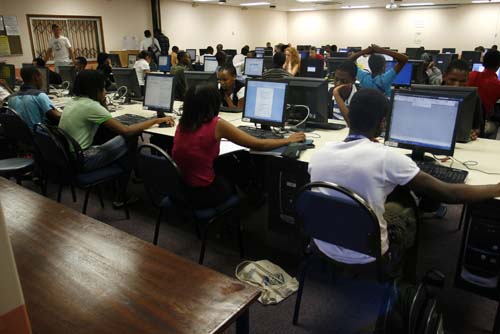EBE mini-semester positive experience for staff and students

One of the consequences of the student protests in 2016 is that four weeks of teaching were lost at the University of Cape Town. For the EBE faculty, this could not be made up by online offerings, as the faculty is heavily dependent on its labs, workshops, studios and advanced computer facilities. The solution was to offer a mini-semester to all EBE students in January 2017.

Asking staff and students to give up their holiday and return to classes early was a big request. However, both staff and students committed themselves to the face-to-face teaching and there was full attendance for the mini-semester. Overall, despite the sacrifices involved it turned out to be a positive experience for both staff and students.
Professor Jenni Case, who lectured during the mini-semester, said that from day one all the students (bar one who was a few days late due to flight problems) attended every lecture. There were a few issues for some of the international students around their visas and flights but otherwise everything seemed to go smoothly.
Most attendees were enthusiastic and engaged in the classes. "Walking through the NEB, you could feel the buzz in the foyer area where students were working together on various projects," said Jenni Case.
Speaking to students who attended the mini-semester, it seems the sentiment was the same. Most reported that they found the sessions very helpful and felt they were much better prepared for the deferred exams.
Tondani Nevhutalu, a third-year civil engineering student said, “We got back to learning and studying and felt we gained a study advantage. We were back in study mode and were ready for the deferred exams.” She added, “Everyone was very supportive. We could engage with our lecturers and there was a comradely spirit amongst the students. It was great to get back and see all my friends.”
Malibongwe Manono, a lecturer and PhD student who coordinated and facilitated the design project for second-year chemical engineering students said similar things. “Most of the students attended the course except for one or two who were still doing vac work or were ill,” he said. “The students responded positively and were well-prepared for the course which I hadn’t expected.” After the disruptive end to 2016, Malibongwe felt the mini-semester provided a space that allowed the students a time to work on their projects in a relaxed and stress-free environment. The interactive Q&A platform on Vula helped in responding to interesting questions at all times of the day, including questions that came in whilst he had attended a church service on a Sunday.
The Dean, Professor Alison Lewis said, “Looking back, the six weeks of protests and disruptions in 2016 were an extremely stressful and a challenging time for us all. The staff in this faculty were truly inspiring in their commitment, diligence and thoughtfulness regarding the interests of the students in this crisis. I am extremely proud and grateful to be part of this faculty.”